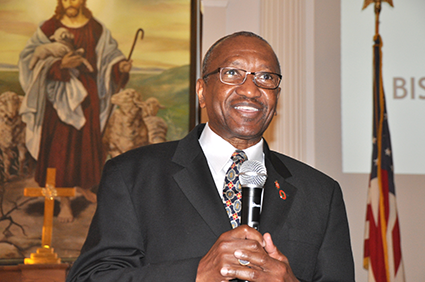
We are the ones,' bishop tells districts

By Melissa Lauber
UMConnection Staff
At these meetings, which featured conversations with Bishop Marcus Matthews, the song “I Need You to Survive” was a focal point as the bishop shared the message that we are the ones God has called to be in ministry in this time and place. The people responded with their passions and concerns.
At Mt. Zion UMC in Bel Air, clergy and laity met in the tent-like worship space and prayed for the Rev. Craig McLaughlin, whose daughter had died just days before the meeting. Later, someone asked what the tent was made of.
Giving “a preacher’s answer,” McLaughlin answered it was constructed of the untraditional and things that have never been tried before. He went on to lament the decline of The United Methodist Church. “What Methodists have is a lot of love in our churches, but we’re still doing things the way we did in 1958. Look at who is growing – independent churches that are doing nothing traditional. …. If we keep doing everything the way we always have, we will die.”
At the session with the laity in the Greater Washington District, the superintendent, the Rev. Joseph Daniels, echoed this sentiment.
“Today, only 17 percent of Americans worship in any church, synagogue or mosque on a weekly basis,” he said. “They’re saying we’re irrelevant. We need to begin to take the Gospel to the streets, get to know people by name and engage where there is the greatest need. Only then will lives change; even the church will change.”
Bishop Matthews encouraged those present to “Seize the very moment in which we are living. Don’t get caught holding onto past stuff,” he said. “We are the one God is looking toward to make a difference.”
Throughout the eight districts, members shared the new ministries and ideas they were embracing. Two of the laity sessions were canceled due to the weather.
In Frederick, they heard about how the church is supporting Ellie Walton, a documentary filmmaker who is a member of Middletown UMC, in making a film about the Hope School for the Deaf in Monrovia, Liberia.
During the filming, American and Liberian rap stars Famus, Takun J, and Trade, serendipitously met and joined forces to make a music video about the school called “Just Like You.” The sign language for that title is becoming a common greeting for people across Monrovia, said the Rev. Susan Halse.
The Cumberland-Hagerstown District held an impromptu book sale during their session, raising money for the Imagine No Malaria initiative. In the Baltimore-Suburban District, the Rev. Stacey Nickerson shared information on the teenage residents of the Board of Child Care being involved in service projects and how they are interested in forming partnerships with local congregations interested in mission projects.
At the Greater Washington session, a member from Mt. Zion UMC told about their ministry with the “shelter-challenged,” which led to a homeless man joining and becoming an active member of their congregation.
Those at the session also expressed their concerns about divisions arising in the denomination around the issue of same-gender marriage. Others implored the church to be more active in the lives of the poor.
Potential changes in health care benefits for the clergy, the importance of clergy observing Sabbath, the need for covenant groups, the potential of community gardens, new ways of thinking about small churches, a ministry of filling and distributing backpacks to feed hungry children over the weekends, and even the rivalry between United Methodist chaplains to area high school football teams were all discussed at the district sessions.
Matthews soothed some of the concerns by quoting the title of a recent sermon he had heard by the Rev. Ianther Mills. “Today’s test is tomorrow’s testimony,” he said.
But he also challenged the clergy and laity of the Baltimore-Washington Conference. “I don’t think our job is to just feed people what they want. Our job is to speak the Gospel the best that we know how,” he said. “It is time for us to do what God has laid on our hearts and minds.”

Login/Register to leave comment